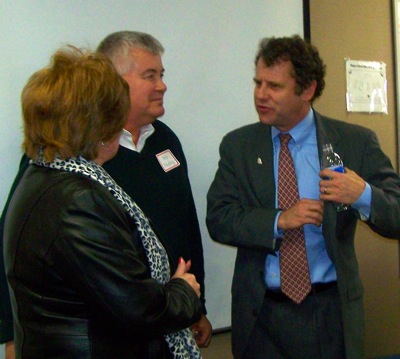Saturday, January 5th, 2008
Sen. Brown listens up
By Pat Royse

Photo by Pat Royse/The Daily Standard
U. S. Senator Sherrod Brown talks to Mercer County Commissioner Bob Nuding and a panel member following a meeting Friday afternoon with community leaders in the conference room at the Central Services Building.
U. S. Senator Sherrod Brown didn't speak much at Friday's meeting in Celina with community leaders. But he says he listens well.
In Mercer County on the 50th out of 70 similar meetings planned, he said, "I always learn something I didn't know on these visits." That is why he does the traveling, he says.
It's a chance to find out what some of the local problems are and what he might be able to do to help, Brown said.
But at the meeting he mostly asked questions and sought input from local leaders.
He questioned each of a panel of 17 people, representing schools, service organizations, farmers, labor, businesses, city and county representatives, and police and fire officials, on specific and general problems.
A few members of the audience of about 35 more also had questions.
Brown began with the implementation of the No Child Left Behind (NCLB) program in schools - how is it working? Educational Service Center Superintendent Andy Smith told Brown that while accountability was good, a value added approach needs to be applied to the testing.
He suggested measuring improvement from where the child starts, with goals of raising each child one year from where they were at the beginning of the school year.
"That would eliminate all demographic issues," Smith told Brown.
Diana Spencer, a supervisor of special education for several schools, said that NCLB raised the bar and many have done well. But she said all students are expected to pass the same test. Some children learn slower than others, she explained.
"There is no in-between," she said of the gap between the average student and the severely disabled, who are flexibility in testing. There is no way some children can learn as fast as others and schools should not be cited for not getting the required improvement in the set time, she explained.
Brown told the group that he had gotten a provision in the farm bill, under the Conservation Reserve Program (CPR) that would provide incentives for farmers to put filter strips near their streams and ditches.
But he warned the bill was in conference and still may be vetoed by the president for other reasons.
He encouraged those attending to write to U.S. Rep. John Boehner, R- West Chester, encouraging him also to keep working on the provision in the bill.
Asked by Brown about the prescription drug program for seniors, Karen Howick of the Council of Aging, said there were quite a few local seniors who were just above the poverty line and were paying more than they could afford.
"There is a lot more paper work and sometimes it is more than they can (cognitively) handle," she said.
Among the other topics was expanding crop insurance, alternative energy, a short discussion of family owned ag businesses, such as Cooper farms, a concern of the high price of grain for animal and poultry farming, the future shortage of health care nursing and other health professionals, the need for more manufacturing jobs in the county and a listing of jobs lost in the last decade or so, the percentage of hospital services to Medicare (about 48 percent) and Medicaid (about 10 percent), problems with low birth weight babies (less than 1 percent), health care for veterans, the tourism, job retraining and the need by police and fire officials to be able to track cell phones.
A Right-to-Life audience member asked if he would agree with them on stem cell and other life issues. Her question drew applause. Brown said he disagreed with her and disagreed with the polarization that issue called. "I wish the two sides could work to reduce unwanted pregnancy. I wish that every child was wanted. But I won't engage in a partisan debate, he said. His comments also drew applause.
An audience member mentioned the biodiesel plant explosion in Defiance on Thursday and asked if such plants could be placed away from population centers.
Brown said placement of manufacturing buildings was not a federal issue but was a state and local zoning issue.
Later Brown commented on a couple of issues that were brought up. He agreed that NCLB needed to be changed or perhaps rescinded and rewritten all together. He also said the Medicare drug program should be changed so the nation could negotiate prices for drugs that seniors need.




